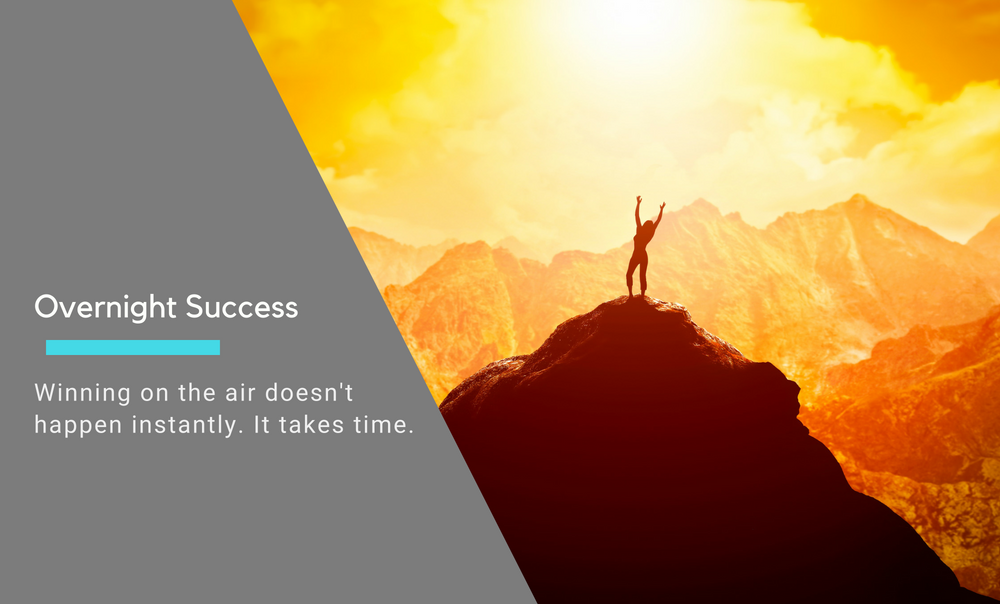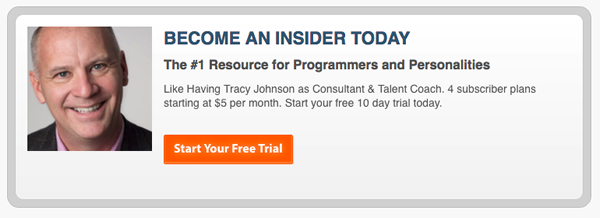Tracy Johnson: Radio Shows and the Overnight Success myth

We are all impatient, aren’t we? We want what we want when we want it. It’s part of the DNA of contemporary life.
And when we get a great idea, it goes on the air right away. And naturally, we expect immediate results. We want to catch lightning in bottle. We are attracted by the prospect of overnight success.
Broadcasters do this all the time. A new morning show is hired, and the next ratings period is down. They want to know why, and immediately start questioning the strategy. The next book shows little improvement. Or, maybe it’s lower again. Now management questions if this was a mistake, and maybe we should start looking for the next overnight success.
And personalities feel the anxiety. They sense when confidence starts to fade.
Personality radio takes time.
The Overnight Success Myth
Whether you’re Elvis Duran, Ryan Seacrest, Howard Stern or Bobby Bones, winning radio shows rarely produce overnight success stories. Personalities become successful by forming a relationship with listeners. It takes time for talent to find their voice and perfect it, and relationships between listeners and radio shows grow in stages.
Winning personalities build a deep bond with listeners, causing the audience to fall in love with them in stages. I call the process the Personality Success Path. It doesn’t happen overnight.
Randy Lane pointed out a research project by Jeffrey Hall, a researcher in communications at Kansas University. Hall conducted a study to measure how long it takes for a friendship to develop from first meeting to becoming besties.
His findings show that:
It takes 94 hours to go from acquaintance to casual friends.
Serious friendship happens at about 164 hours.
Best friend status takes place at around 219 hours.
Think about that. Then consider how much time listeners spend with a radio show each day.
They listen for very short periods, usually less than 10 minutes per occasion. In all, the average P1 contributes about 6 quarter hours of listening per week to a radio show.
That’s just 1.5 hours. At that rate, it takes 62 weeks for a P1 to become a casual friend. That’s more than a year.
To become a fan (Best Friend), would take 146 weeks. That’s nearly three years.
You Can’t Hurry Love
There are things that can accelerate the process, but as the song goes, You Can’t Hurry Love.
When starting through the Personality Success Path, I encourage talent to focus only on moving from their current stage to the next. When starting out, the faster one can advance from Stage 1 (Introduction) to Stage 2 (Familiarity), the better. Then, getting into Stage 3 (Growth) is when the real progress happens.
The sad thing is many personalities are stuck in Stage 1 or 2 for years. Some for decades.
That’s why it’s so important to establish specific reasons to listen. The audience tunes in first to hear the things you do. That’s why features are such a powerful tool for building a personality brand.
They become fans because of who you are. Surrounding those features with content that displays character traits through perspective, point of view and personal observations helps listeners connect with you.
Time Is Just One Factor
Of course, putting on a show and waiting isn’t a recipe for automatic success either. Winning personality shows aren’t simply a function of duration. Just because a show has been on for years doesn’t mean they’ll advance through the 5 Stages of Growth.
There are many shows that have been on for a decade or more and have failed to make it beyond Stage 2. Listeners have heard of them, but don’t know anything about them or really care. They haven’t made an impact.
Great management teams are able to identify shows that need more time to nurture an audience relationship. This is where patience is a virtue. If a show has potential, management’s role is to provide an environment that produces confidence. Help them stay the course through good times and bad (ratings period). Avoid over-reactions in both directions and stay off the emotional roller coaster.
Panicked decisions rarely result in positive outcomes. Instead, trust the decisions already made.
But Don’t Coast
A frequent result of management exercising patience leads to ignoring problem areas. Some think just giving it time will cure for problems. It won’t.
Every show has growing pains and will fail to some degree.
Identify weaknesses quickly and be proactive to strengthen areas that need it. This can be a positive, fun exercise.
Make necessary adjustments, critique the results and study the most effective ideas. Evaluate the impact of the tweaks, and build on positive adjustments while taking the next step. This will build a stronger show while the audience continues to become familiar. In fact, it will accelerate the process as the building blocks of the show are forming a solid foundationn.
Conclusion
Everyone wants overnight success. But it hardly ever happens.
Many stations start the process of building an amazing personality brand. They make it through the first two stages, and are starting into Stage 3. Some are on the verge of their big breakthrough.
Then, at the edge of great success, management loses patience. They pull the plug or change the show at just the wrong time. And the process starts over.
Building a successful personality brand takes courage, persistence and commitment. It also takes expertise to build a show that connects to listeners emotionally.
If you’re a manager looking for help in knowing whether show has potential and how to get them to the top, let me know. I’d love to help.
If you’re an air talent looking for a breakthrough to find your voice and get on a Personality Success Path, check out my Audience Magnet Course. It has everything you need to succeed.
Just be prepared. Winning radio shows don’t happen as quickly as we would like or think they should. It won’t be an overnight success.
Tracy Johnson specializes in radio talent coaching, radio consulting for programming and promotions and developing digital strategies for brands.



